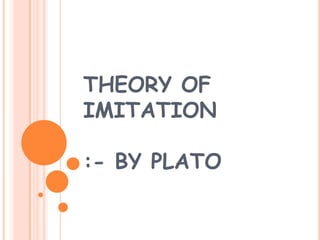Theory of imitation
•Descargar como PPTX, PDF•
33 recomendaciones•62,571 vistas
Denunciar
Compartir
Denunciar
Compartir

Más contenido relacionado
La actualidad más candente
La actualidad más candente (20)
Plato's Objection to Poetry and Aristotle's Defence

Plato's Objection to Poetry and Aristotle's Defence
Destacado
Destacado (12)
Similar a Theory of imitation
Similar a Theory of imitation (20)
Running Head IMITATIVE ART1IMITATIVE ART3Imit.docx

Running Head IMITATIVE ART1IMITATIVE ART3Imit.docx
MODULE 4 (Art and Philosophy- Imitationism and Representationism).pdf

MODULE 4 (Art and Philosophy- Imitationism and Representationism).pdf
Functions and Philosophical Perspectives on Art.pptx

Functions and Philosophical Perspectives on Art.pptx
Plato Philosophy on Art And Aesthetics by Anuj Kumar Maurya

Plato Philosophy on Art And Aesthetics by Anuj Kumar Maurya
Plato's charges against poetryas a foundational principle, has deep .pdf

Plato's charges against poetryas a foundational principle, has deep .pdf
Theory of imitation
- 1. THEORY OF IMITATION :- BY PLATO
- 2. “The right function of art is to put before the soul the images what is instrinsically great and beautiful.”-Plato
- 3. INTRODUCTION Plato was a great Greek critic of literature, philosopher, thinker, educatio nalist. He was also a fine literary stylist and great story teller. He introduce “theory of imitation ‘’
- 4. According to him, the nature is only true and other materials are imitation or copy of the truth. So literature and poetry are not true it’s imitation of nature.
- 5. He gives an example of a carpenter and a chair to understand theory of imitation.
- 6. The idea of ‘chair’ first came in the mind on carpenter. He gave physical shape to his idea out of wood and created a chair. The painter imitated the chair of carpenter. Thus, painter chair is twice to remove from reality.
- 7. Literature is harmful to the society and misguide the people of country and spoil the youth. Plato also against poetry. He wanted to banish poets from the country because he believed that poetry spoil the young mind.
- 8. CONCLUSION Plato is a great critic and his view of imitation is true at some point but the poetry is not harmful to the society. So, the view of Plato should not followed in literature.
